Life Before Legend: Stories of the Criminal and the Prodigy Read online
Page 2
She pulls away. Although she doesn’t take her hand off my arm, her grip is less ironclad. I’m still trying to catch my breath. “Not too bad for your first try,” she says cheerfully. Her nose brushes against mine. “Are you trembling?”
I cringe. I’d hoped she wouldn’t notice.
To my relief, she laughs before I can say anything embarrassing. “Boy, you are just cute as a goddy button.” She taps my nose and leans away from me. “All right, we got a deal. Back to the pier. If you behave yourself the whole time, I might even give you another kiss.”
For the next three days, I work alongside her on her father’s Republic-assigned boat. Her name is Charlie, I learn, and she just turned sixteen. She tells me about her life working the piers as we load and unload shipments from dawn until dusk. Her mother had died a few years ago in a factory accident. She has a sister who actually got a Trial score high enough to get her assigned to a college. She loves the lake area, even if it means she smells like the ocean all the time. She’s happy that the Republic at least assigned her to work the piers with her father, instead of sending her off to the warfront to clean up after the troops. I don’t bother telling her that that’s what my father does—did, I mean—before he stopped coming home. My hands get splinters from dragging crates back and forth, and by the second day, my back feels like it’s going to break into pieces. Charlie’s dad—an enormous, bearded, pale-skinned man—ignores me completely, although sometimes he’ll nod in approval if I’m working really hard.
I like the job. The girl gives me two cans a day instead of just one, which means every day I get to eat a can as well as save one for future meals. I also get a chance to stash trinkets that might be useful later on—sharp splinters of wood I could use as weapons, a couple of abandoned burlap sacks, a round tin good for carrying water.
Charlie catches me as I walk along the pier, snatching up stray nails and stuffing them in my pockets.
“What are you doing, preparing for battle?” she asks with a grin.
I shrug. “I haven’t survived this long without some self-defense.”
Charlie laughs, but she lets me carry on.
In the evenings she sits with me while her father’s crew gathers farther down the pier. I watch, with a little jealousy, the way she flirts with the workers whenever her dad’s not around. She was right about one thing—she’s their darling, and if she ever told them to throw me overboard, they’d probably do it without hesitating. Slowly I grow used to the sound of the lake lapping against cement pillars and the unusual comfort of sleeping out in the open, knowing that in the morning I’d have a can of food waiting for me. What a luxury. Sometimes I’ll glance over at Charlie when she’s not looking, and I’ll try to replay our kiss in my head. I wonder if it meant anything to her. And whether or not she was serious about giving me another.
On our last night together, Charlie leans back and regards me over the glow of our dim lamp. We’re sitting together at the far end of the pier, watching the skyscrapers of downtown light up one by one. Pretty nice evening. Even the humidity doesn’t seem as bad as usual, and now and then I can feel a cool breeze.
“So, you paid off your debt. What are you going to do tomorrow?” she asks me.
I shrug. “Don’t know yet. I usually take things one day at a time.”
We eat in silence for a few more minutes before she speaks up again. “You haven’t told me much about yourself,” she says. “I don’t even know your name.”
I put down my half-eaten can of sausage and beans, then lean back on my elbows. “Ed,” I reply, blurting out the first name I can think of. “What else do you want to know?”
She studies me. In the flickering lamplight, her eyes take on a honey-colored tint. “How long have you lived in Lake?” She takes another bite of food and then tosses her can aside. “What happened to your family? And how’d your knee get that way? You always lived on the streets, or what?”
I’m quiet throughout her questions. It’s only fair that she’s asking, of course, since she’s told me so much about herself. But if there’s one thing I’ve learned from living on the streets, it’s to keep details about myself secret. Where would I even start? My name’s Day. My family lives about thirty blocks northeast of here. I have a mother, an older brother, and a younger brother. All of them think I’m dead. Republic doctors sliced open my knee while experimenting on my body. I was shipped to them after failing my Trial, and they’d left me for dead in a hospital basement. I stumbled around, bleeding, for weeks afterward. I always travel alone, because if the Republic ever finds me, they’ll snuff me out like a candle. I keep my head turned away as the memories fill me up and threaten to burst out of my chest. So many stories to tell.
But I fold them away one by one.
Charlie sobers at my silence. “Well,” she starts, looking a little awkward for the first time since she’s known me. She fiddles with one of her braids. “All in good time, whenever you’re ready.”
I smile at her over the lamplight.
“If you want, you know, you can stay for a few more days,” she says. “My dad says you’re a good worker and proved your worth . . . he’d be happy to keep you around a little longer. He might even give you some wages under the table. And, well, you’re a nice kid. The streets are a harsh place to live—I dunno how long you’ll make it out there on your own.”
Her offer’s tempting. My heart warms, and there are unspoken words of gratitude on the tip of my tongue. I soak in her freckled face and rumpled braids, and in this moment I’m completely ready to say yes. I can see myself working here beside her and making some sort of life for myself. I ache to belong to a family again, to become friends with this girl. Wouldn’t that be something, yeah? I close my eyes and lose myself to the fantasy.
“I’ll think about it,” I finally reply. It’s a good enough answer for now.
Charlie shrugs, and we both go back to finishing our dinners. We sleep side by side out on her boat’s deck that night, close enough that our shoulders touch and I can feel the warmth coming from her body. I spend most of the night looking up at the sky. It’s clear enough for me to make out about a dozen stars. I count them over and over again until they lull me into a light sleep.
A shriek jolts me awake.
I instinctively hop to my feet, then wince as my bad knee twists and forces me to sit back down. My pouch of random trinkets pokes me uncomfortably in my side. What’s going on? What happened? Is it morning? All I notice in my confusion is the dim light of dawn that paints everything bluish gray.
“No! You can’t!”
Another shriek. This time I hear it come from farther down the pier, where the crew’s crowded around something. Curious passersby have started accumulating along the street. Don’t get close. Stay away. My instincts flare up, and instead of joining them, I hurry over to a nearby stack of crates and crouch in the shadows.
At first I can’t tell what’s going on. Then, as I squint closer at the scene, I realize what’s happening. A few Republic soldiers dressed in the attire of a city patrol—not street police, an actual city patrol—are shouting questions at a large man. Charlie’s dad. The shrieks come from Charlie, whom several of the crew members are holding back.
One city patrol soldier punches her father squarely in the jaw. He falls to his knees.
“You damn dogs!” Charlie shouts at the patrol. “You liars! We’re not behind on shipments—we’re not even in charge of that! You can’t—”
“Calm down,” one of the soldiers snaps at her. “Or you’ll feel the bite of a bullet. Got that?” Then he nods to his companions. “Confiscate their shipment.”
Charlie screams something I can’t make out, but her father shakes his head at her, giving her a firm warning. A trail of blood leaks from the edge of his mouth. “It’ll be okay,” he calls out to her even as the soldiers hurry along the end of the pier and load crates onto their truck.
I wait quietly in the dark as they fill their truck. If they
take Charlie’s whole shipment, then that means they won’t get paid for at least two weeks. Some of them would go hungry for sure. A memory rushes back to me of when the city patrols had once taken my dad away for questioning, how they’d brought him back bloodied and broken. Anger and recklessness rush through my mind. I narrow my eyes at the soldiers, then dart quietly from the shadows to the edge of the water. As the chaos continues to unfold at the end of the pier, no one notices as I slip soundlessly into the water and make my way off along the shore. My bad knee protests as I paddle, but I grit my teeth and ignore it.
When I’ve swum far enough to reach the next set of piers, I make my way up to the banks, crawl up to street level, and melt into the early-morning crowds. Water drips down my chin; my soggy boots squish with each step I take. The soldiers will probably take another few minutes to finish loading everything up and checking off the crates—by the time they head back out this way to Lake’s police station, I’ll be ready for them. As I limp through the crowds, I reach down to my belt and tug open the pouch of trinkets. I’ve got a good stash of nails. I scatter them all across the street until I’m confident that I’ve covered a large swath of the road. Then I turn a corner, dart into a narrow alley, and crouch behind a large trash bin. My knee throbs in protest. I rub wet strands of hair impatiently away from my face.
I gingerly stretch out my leg, wince, and rub at the old scar that runs across my knee. Gotta move fast if I want this to work. I check to make sure my pocketknife’s tucked securely against my boot, then settle in to wait.
A few minutes later, I hear what I’ve been hoping for—the sound of a city patrol truck approaching from farther ahead, its recognizable beeping alarm ringing out down the street. My body tenses.
The truck draws nearer. People clear to either side as it honks its way through the morning rush.
Then—
Pop!
One of the truck’s tires bursts—it skids, then careens haphazardly to one side, sending up some shrieks from the crowd. It crashes to a halt several feet from where my alley is. I struggle to my feet. The back of the truck has popped open in all the chaos, and a dozen or so crates lie open and spilled on the streets.
Two soldiers hop out from the truck right as crowds of people gather around the truck, some already eagerly picking up cans of meat that have rolled out of the broken crates. “Back up!” one soldier shouts in vain at the crowd. The other soldier pushes people back with his rifle.
I rush in with the pack. If I could grab even one of the crates and bring it back to Charlie, I’d call that a win. The people tower over me, jostling me back and forth as everyone tries to snatch a small portion of the food. I duck my head, fold myself down as small as I can, and push doggedly on. Finally, I see the truck before me—and the spilled contents all over the ground.
I reach down and shove two tins of meat right into my pockets. Then I grab the edge of one crate, pull back with all my might, and start dragging it along the ground. Several other soldiers have arrived to back up the original two; I try to work faster as they begin pushing people back from the scene. I clench my jaw and pull harder.
“Hey—get away from that!”
A soldier catches sight of me, grabs me by the collar of my shirt, and tosses me unceremoniously back against the throngs. My bad knee buckles—I cry out in pain and land in a weird position. The soldier grabs the crate I was dragging and shoots me a furious glare. “Damn baby street cons,” he spits at me. “Go back to your alley. Keep your hands off Republic property.”
That’s mine, I scream silently. That’s for Charlie. To my surprise, an urge to cry surges up from a deeper part of me. That’s for my family. For people I care about.
But there’s not much I can do now. I’m too late, I’m too small, and I’m too weak. The scene I’ve caused is useless to me now—enough soldiers have arrived that the people no longer have the guts to grab for the crates’ contents.
I scramble to my feet, then shove my way through the people as the soldiers gather to inspect the burst tire of their truck. At least I banged up one of their precious vehicles, I think darkly.
I make my way back to the pier where Charlie’s crew works. By the time I get there, my knee’s sore. I’m sweaty and exhausted. Charlie sees me from a distance, jumps down from the stack of crates she’s sitting on, and rushes over. “There you are,” she says. She seems to have composed herself since her earlier outburst. Her eyes run over my damp clothes. “Where’d you go?”
I just shrug. I pull the two tins of meat out of my pockets. “There was some sort of commotion down the street,” I reply, handing her the tins. “Truck overturned. I grabbed these. Sorry—they wouldn’t let us get any closer. How’s your dad?”
“He’s okay. He’s taken harder hits before.” Charlie gives me a wry smile of thanks, but hands the tins back to me. “You keep these. Two tins won’t do us much good.” She looks over her shoulder at the crew. Then she bends down, leans toward my ear, and whispers, “That was you, wasn’t it? You saw the whole thing this morning. You found some way to mess that truck up, didn’t you?”
I blink at her. “I—”
Charlie grins when she sees my guilty expression. “Yeah, we were out there too. Your little stunt let some of my dad’s crew get in there and grab a few of our crates back.”
The weight on my chest lifts a little. I look at her in surprise, and then break into a small smile. “You guys were there? You saw the truck?”
Charlie’s eyes study mine. For a moment, it’s as if she can see right into my heart. “You got a death wish or something?” she finally says. She reaches up to ruffle my hair. “I’ll hand it to you—you’ve got some nerves of steel, running off like that and messing up a city patrol’s truck.”
I blush, then look down at my feet. “Just got lucky,” I mutter. But deep down, I can’t help feeling a spark of pride. They’d gotten some of their supplies back. Maybe my stunt hadn’t been useless after all.
Charlie’s expression softens. Her hand lifts my chin so that I meet her stare. She leans down and gives me an affectionate peck on the lips. “Thank you,” she says. “You’re a good kid. I bet the Republic hasn’t seen the last of you.”
I sleep on the boat’s deck with the crew that night. But early the next morning, when dawn has barely reached the water’s edge and Charlie’s eyes are still closed, I get up and sneak quietly away. I take nothing with me except my few trinkets and tins of food. I don’t look at her one last time, and I don’t leave her any notes or say good-bye. The air is cool, nipping at my cheeks and lips, a reminder of the empty space around me. I keep my hands in my pockets and my head held high. My hair is loose.
I can’t stay here. If anything, yesterday’s events reminded me very clearly of why I wander the streets alone, why I don’t dare let myself get tangled up in relationships with anyone else out here in Lake. Soldiers had attacked Charlie’s dad just for falling short on a shipment—what would happen to them if the soldiers found out that they were harboring a boy who’d escaped from the Republic’s labs? A boy who’s supposed to be dead? Dad had always told me to move forward, never backward.
So I keep my toes pointed away from the pier and inland toward the slums. Best to be alone out here. I’m a floating soul, a phantom . . . I belong nowhere. Charlie’s words echo in my mind.
I bet the Republic hasn’t seen the last of you.
I smile. No, I sincerely hope that they haven’t.
My feet feel heavy, but they don’t make a sound.
EPISODE TWO
JUNE
THREE YEARS BEFORE THE EVENTS OF
LEGEND
Author’s Note: In Legend, we meet June just as she’s receiving yet another disciplinary warning from her school, Drake University. The following short story is a peek at June’s very first day at Drake, and why she finds herself incapable of staying out of trouble.
“WHAT’S WITH ALL THIS TRAFFIC?” I ASK MY BROTHER.
Metias leans forwa
rd in the driver’s seat and cranes his neck. He’s in his full captain’s uniform, but from the backseat I can see his hair is tussled, the result of spending most of the morning raking his hands through it. He sighs, gives me an apologetic glance. “Sorry, Junebug. I shouldn’t have taken the shortcut through Lake. Let me get a report,” he says, then mumbles something into his mike.
I cross my arms and count the military jeeps around us to pass the time. (There are exactly nine vehicles in each of the three lanes on the street, as far as I can see.) I try to estimate how much farther we have to go before we’ll reach Drake University. At this rate, it’ll take us at least thirty minutes. Chances are high that I’ll be late for my orientation. Twelve-year-old prodigy officially inducted today at Drake University. That’s what the JumboTrons have been broadcasting. I can still remember the way my heart thumped from accepting my Drake uniform earlier in the week. Today I start school at the university, the only twelve-year-old who will be wandering the campus grounds. The thought sends a pulse of anxiety and excitement through me. What will the other students think? Will I make any friends?
Metias finishes his conversation and looks back at me with a weary frown. “Sounds like the streets throughout north Lake are all jammed—apparently we had to deliver a new truck to some of our guys at a nearby police station.”
“Really? What happened?”
“They busted a tire, right in the middle of a busy street. There’s a huge mess of food crates spilled across a main intersection and a crowd of people fighting over it all.”

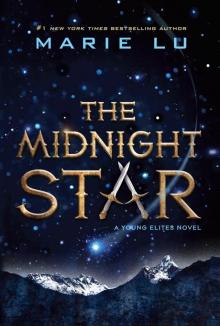 The Midnight Star
The Midnight Star Legend
Legend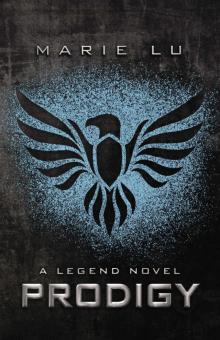 Prodigy
Prodigy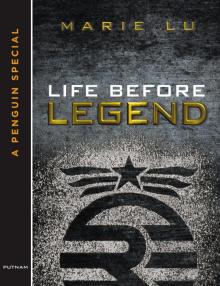 Life Before Legend
Life Before Legend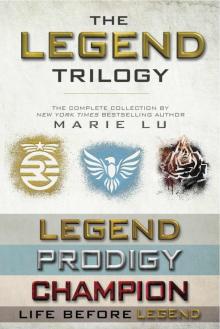 Legend Trilogy Boxed Set
Legend Trilogy Boxed Set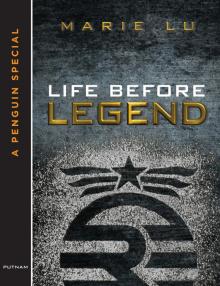 Life Before Legend: Stories of the Criminal and the Prodigy
Life Before Legend: Stories of the Criminal and the Prodigy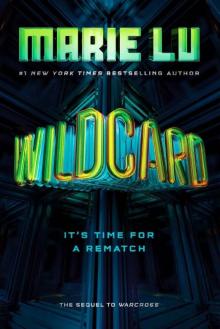 Wildcard
Wildcard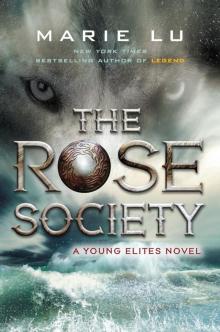 The Rose Society
The Rose Society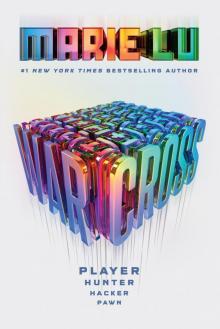 Warcross
Warcross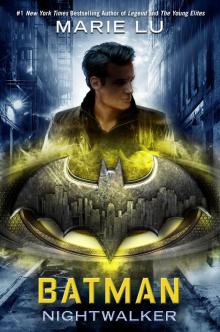 Batman: Nightwalker
Batman: Nightwalker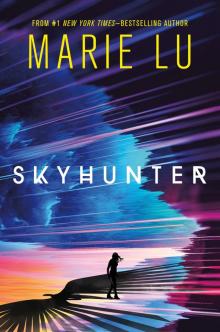 Skyhunter
Skyhunter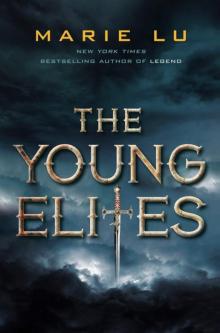 The Young Elites
The Young Elites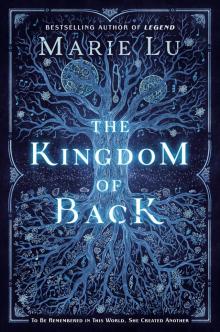 The Kingdom of Back
The Kingdom of Back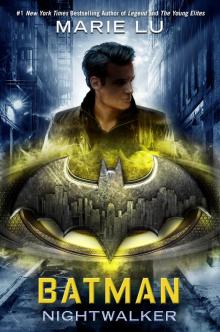 Batman
Batman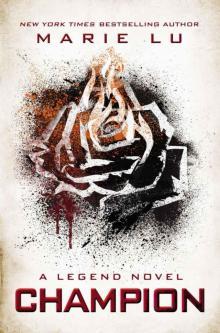 Champion: A Legend Novel
Champion: A Legend Novel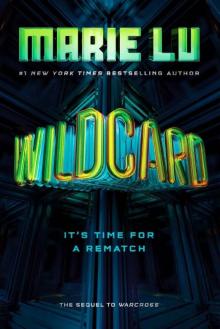 Wildcard (Warcross)
Wildcard (Warcross)